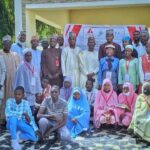Since 2010, the Borno State government has been engaged in a battle of concepts with the terror group, Jama’atu Ahlussunnah Lidda’awati Wal-Jihad, aka Boko Haram, over the lawfulness of western education.
For the sect, ‘boko’ (western education) is ‘haram’ (unlawful); for the government, ‘boko’ is ‘halal’ (lawful). Therefore, the current state of the development of educational infrastructures and human resources points to the victorious among the two arch-foes – the sect and the government.
The sect, right from the onset, hoisted the banner of ‘unlawfulness’ of ‘boko’ as its underpinning concept; hence, with a global-style terror, the insurgents descended massively on, and crushed virtually everything they perceived as representing, western education, as part of its terror war against the entire Nigerian state; a war that has persisted, albeit at a fast lessening degree and force, to this day.
The Boko Haram insurgents devastated among other public properties, about 2,500 classroom blocks, and killed about 2,300 teachers, reducing Western education in Borno State to an unprecedented pathetic state – a near non-existent state.
- Why Yobe is deboarding public schools – Deputy gov
- 180,000 HIV patients access 264 health facilities in Benue
The state government, which, consequently, stood face-to-face with the stark and scary reality of the insurgents exterminating the educational future of the state by destroying every infrastructure and human resources it had developed over the decades, and saw no other option but to most urgently, and very strategically, develop every desired policy to achieve victory in this clash of concepts.
The government first perceived the urgent need to decisively debunk the ‘warped unlawfulness’ concept of the insurgents with regard to Western education.
Consequently, it fashioned out an impromptu programme for the hundreds of thousands of school pupils chased out, along with their parents, from their communities to the Maiduguri metropolis as IDPs, to resume schooling in the metropolis, pending the implementation of long-term solution programmes.
Hence, since 2017, pricked by the huge fear of losing the future of these children, amidst what it observed as a gradual restoration of security, the state government envisioned expansive programmes and projects aimed at accelerating the reconstruction of education in the two most critical sectors of infrastructure and human resources, to secure the educational future of the state from the catastrophic intents and activities of the insurgents.
Anything less, the government still believes, would plunge the state fast into inconsequence among its sister states of the Nigerian federation, in spite of Borno’s historical and political significance in the Nigerian nation.
This decision, especially under the current administration of Governor Babagana Umara Zulum, forms one of the most critical components of the broadening reconstruction of the state’s economy for post-terror prosperity.
Ascending the governorship throne in 2019, Professor Babagana Umara Zulum, with his toolkit containing his 10-pact agenda, and in subsequent years, a 25-year development plan, strapped to his shoulders, set out to do the work of rebuilding and repositioning the state on the path of prosperity.
One of the most critical components of Zulum’s agenda and subsequent strategic development plans has been the resuscitation, development and upscaling of the quality of education for the children and youths as the foundation for guaranteeing the desired reconstruction and prosperity of the state economy.
Right from the onset of his first tenure, with the growing need for the multiplication of school infrastructure and enrolment amidst the restoration of more peace and security, Zulum observed as grossly inadequate the 54 mega schools he inherited from his predecessor, now vice president, Kashim Shettima.
Consequently, from 2019 to date, the current administration of Babagana Zulum, has executed 124 projects in the education sector in Borno State, which comprises the construction of over 30 new mega schools and the rehabilitation of 1,087 classrooms in several schools across the state.
The administration came face-to-face with the sharp contrast between the urgent need to resuscitate and upscale the quality of education, and the virtual incompetence of majority of the teachers to deliver that desired education—the administration inherited an unqualified teaching force in the education sector.
This situation prompted a competency test for the then over 8,000 primary school teachers across all the 27 local government areas from January 5 to January 20, 2022. Out of the teachers who underwent the test, 5,257 passed and were declared fully qualified to teach, 6,226 failed but were assessed as re-trainable, while 4,339 failed woefully and were assessed as untrainable.
For the retraining of 2,730 of the 6,226 trainable teachers, the Zulum administration, while inaugurating the newly appointed 27 local government education secretaries, approved the allocation of N1 billion.
“These teachers will undergo training at the College of Education Waka-Biu and Umar Ibn Ibrahim Elkanemi College of Education, Science and Technology Bama for a three-month sandwich programme for 1,884 teachers and a full-time NCE programme for 846 teachers,” Governor Zulum recently explained.
“We have no business of failing or retrenching teachers but only qualified teachers would teach in our primary schools and there is no going back,” Governor Zulum declared on Monday, May 6, at the flagging off of the training of the first phase training of 1,949 teachers of the Local Education Authority (LEA) from the 27 LGAs of the state at the College of Education Waka-Biu.
“If I cannot allow my child to be trained by somebody who is not qualified to teach, then how would I allow the children of the masses to be trained by unqualified teacher?” Zulum queried.
He urged the trainees to utilize what he observed as the golden opportunity the training programme offered them to pass the examination at the end of the three-month exercise to enable them to earn the N30,000 minimum wage.
On his executive behest, the trainees were placed on a monthly stipend of N30,000, in addition to their regular salaries; and an additional N50,000 for each of them to ensure adequate preparation for the training.
The primary objective of the training, according to the governor, is to tackle the longstanding issues surrounding remuneration, retention and, most importantly, the competence of teachers in accordance with national standards.
The Zulum administration has also recruited over 4,000 new teachers, deployed strategies to reduce out-of-school children from two million children to 800,000 in 2024 and approved over N4 billion as scholarships for Borno indigenes in local and foreign institutions.
“It is my candid belief that the education sector is undergoing a tremendous transformation, ranging from human and infrastructural development,” the state chairman of the Nigerian Union of Teachers, Zali Audu Garba, remarked.

 Join Daily Trust WhatsApp Community For Quick Access To News and Happenings Around You.
Join Daily Trust WhatsApp Community For Quick Access To News and Happenings Around You.


